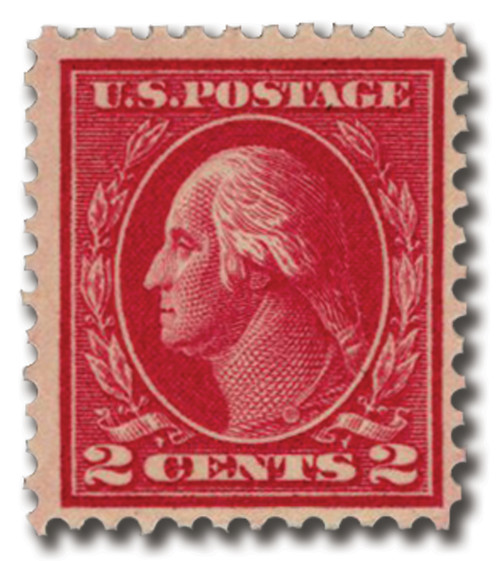
1919 2c Washington, Vertical Pair, Imperforate Horizontally
# 540a - 1919 2c Washington, Vertical Pair, Imperforate Horizontally
$59.00 - $300.00
U.S. #540a
1919-21 2¢ Washington
Coil Waste Pair
1919-21 2¢ Washington
Coil Waste Pair
Issue Date: 1919
Printed by: Bureau of Engraving and Printing
Method: Rotary press
Watermark: None
Perforation: Imperforate horizontally
Color: Carmine rose
Type III
Some of the primary features of the Series of 1919-21 2¢ Type III Rotary Press Washington stamps are: the left ribbon has two shading lines on the top fold, the second fold of the right ribbon; the bottom two strands of hair behind Washington’s ear extend past the vertical strands to their right; and the top-right laurel berry shows a distinct “V.”
1919-21 Coil Waste Stamps
Due to poor centering and other minor defects, a number of coil stamp sheets had been set aside as “waste” to be destroyed. Some of them had been perforated vertically or horizontally, while others had not been perforated at all. Although these stamps were unsuitable for coils, they could be issued satisfactorily as sheet stamps.
In an effort to save money, which was still in short supply after the war, the Bureau decided to release these stamps in sheets. Numerous sheets of the 1¢ Green, 2¢ Carmine Rose, and 3¢ Violet had already been perforated 10 vertically. They were then perforated 11 horizontally and issued with 11x10 perforations.
Other sheets of the 1¢ stamps had been perforated 10 horizontally and were then perforated 11 vertically. Meanwhile, other sheets hadn’t been perforated at all. These 1¢ and 2¢ sheets were perforated with the current standard of 11x11 perforations measured the same as the current sheet stamps being issued. However, when compared, the “coil waste” issues are noticeably darker in color.
U.S. #540a
1919-21 2¢ Washington
Coil Waste Pair
1919-21 2¢ Washington
Coil Waste Pair
Issue Date: 1919
Printed by: Bureau of Engraving and Printing
Method: Rotary press
Watermark: None
Perforation: Imperforate horizontally
Color: Carmine rose
Type III
Some of the primary features of the Series of 1919-21 2¢ Type III Rotary Press Washington stamps are: the left ribbon has two shading lines on the top fold, the second fold of the right ribbon; the bottom two strands of hair behind Washington’s ear extend past the vertical strands to their right; and the top-right laurel berry shows a distinct “V.”
1919-21 Coil Waste Stamps
Due to poor centering and other minor defects, a number of coil stamp sheets had been set aside as “waste” to be destroyed. Some of them had been perforated vertically or horizontally, while others had not been perforated at all. Although these stamps were unsuitable for coils, they could be issued satisfactorily as sheet stamps.
In an effort to save money, which was still in short supply after the war, the Bureau decided to release these stamps in sheets. Numerous sheets of the 1¢ Green, 2¢ Carmine Rose, and 3¢ Violet had already been perforated 10 vertically. They were then perforated 11 horizontally and issued with 11x10 perforations.
Other sheets of the 1¢ stamps had been perforated 10 horizontally and were then perforated 11 vertically. Meanwhile, other sheets hadn’t been perforated at all. These 1¢ and 2¢ sheets were perforated with the current standard of 11x11 perforations measured the same as the current sheet stamps being issued. However, when compared, the “coil waste” issues are noticeably darker in color.
















